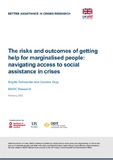The Risks and Outcomes of Getting Help for Marginalised People: Navigating Access to Social Assistance in Crises
| dc.contributor.author | Rohwerder, Brigitte | |
| dc.contributor.author | Szyp, Carolina | |
| dc.date.accessioned | 2022-02-07T09:35:27Z | |
| dc.date.available | 2022-02-07T09:35:27Z | |
| dc.date.issued | 2022-02 | |
| dc.identifier.citation | Rohwerder, B. and Szyp, C. (2022) The Risks and Outcomes of Getting Help for Marginalised People: Navigating Access to Social Assistance in Crises, BASIC Research Working Paper 7, Brighton: Institute of Development Studies, DOI: 10.19088/BASIC.2022.007 | en |
| dc.identifier.uri | https://opendocs.ids.ac.uk/opendocs/handle/20.500.12413/17141 | |
| dc.description.abstract | Crises exacerbate existing inequalities and vulnerabilities for marginalised people, including women and girls, children and youth, older people, people with disabilities, ethnic and religious minorities, and sexual and gender minorities. Many of them face multiple and intersecting inequalities, especially people who are forcibly displaced. Social assistance seeks to alleviate crisis impacts by protecting vulnerable people and averting them from deprivation, but the same structures and systems that make some people more exposed (and excluded) generally can exclude them from social assistance in crises and further undermine their situation. There is substantial literature that already discusses the benefits and opportunities of social assistance generally. The added value of this paper is in examining the risks of navigating access to social assistance in crises for these marginalised people, and the positive and negative outcomes of accessing or not accessing this assistance. The existing evidence suggests that social assistance can improve marginalised people’s food security, help households meet their basic needs, reduce stress and household tensions, reduce gender-based violence, improve health, education, and wellbeing, and reduce negative coping mechanisms. However, it can also disrupt their social support mechanisms and expose them to violence and further risks. Such risks – some of which also apply to those who are excluded from social assistance, and which do not apply to all marginalised people all the time similarly – include neglect, discrimination, sexual exploitation and abuse, increased household and community tensions, gender-based violence, stigma, theft, and accessibility issues. | en |
| dc.description.abstract | This revised version of BASIC Working Paper 7 was uploaded on 1st November 2022. The revised version includes three additional sections on the focus (1.3) and structure (1.4) of the paper, and a note on vulnerability (1.5). | |
| dc.language.iso | en | en |
| dc.publisher | Institute of Development Studies | en |
| dc.relation.ispartofseries | BASIC Research Working Paper;7 | |
| dc.rights | This publication (excluding the logos) may be reproduced free of charge in any format or medium, provided that it is reproduced accurately and not used in a misleading context. The material must be acknowledged as IDS copyright with the title and source of the publication specified. | en |
| dc.rights.uri | https://creativecommons.org/licenses/by/4.0/ | en |
| dc.title | The Risks and Outcomes of Getting Help for Marginalised People: Navigating Access to Social Assistance in Crises | en |
| dc.type | Series paper (non-IDS) | en |
| dc.rights.holder | © Institute of Development Studies | en |
| dc.identifier.team | Resource Politics | en |
| dc.identifier.doi | 10.19088/BASIC.2022.007 | |
| rioxxterms.funder | Default funder | en |
| rioxxterms.identifier.project | BASIC Research | en |
| rioxxterms.version | VoR | en |
| rioxxterms.versionofrecord | 10.19088/BASIC.2022.007 | en |
| rioxxterms.funder.project | dfdd0680-b917-42b1-9d8f-2def2e31f8f1 | en |
Files in this item
This item appears in the following Collection(s)
-
BASIC Research [39]
Except where otherwise noted, this item's license is described as This publication (excluding the logos) may be reproduced free of charge in any format or medium, provided that it is reproduced
accurately and not used in a misleading context. The material must be acknowledged as IDS copyright with the title and source
of the publication specified.


